 Projectors are a great way to share presentations and media with a large audience. You may be wondering, Do Projector Bulbs Burn Out?
Projectors are a great way to share presentations and media with a large audience. You may be wondering, Do Projector Bulbs Burn Out?
And what happens when the projector bulb burns out? Do you have to replace the entire projector, or is there a cheaper option?
We’ll look at how long projector lamps typically last and what you can do when they eventually expire. We’ll also discuss some of the factors that may affect bulb life. So, whether you’re new to using projectors or just want to know more about their inner workings.
Do projector bulbs burn out: And What Are the Signs?
Do projector bulbs burn out?
Unfortunately, Yes, they do. Over time, the filament in the projector bulb will degrade and eventually break, causing the bulb to burn out. The projector lamp lifespan can vary depending on the make and model of the projector and how often it is used.
How many types of projector lamps Are there & How long do projector lamps Last?
There are five types of projector bulbs: LED, LCD, DLP, Hybrid Projectors, and laser lamps. Every kind of projector lamp has its own benefits and disadvantages.
1: LED projector Lamp
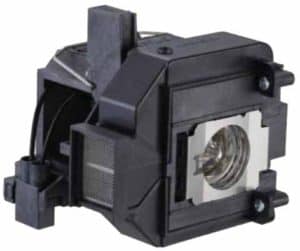
LED (light-emitting diodes) projector lamp technology has come a long way. Today’s LED projector lamps can produce extremely high-quality images while also lasting much longer than traditional bulbs.
LED projectors have several advantages over their traditional counterparts.
First, they are much more energy-efficient since LEDs use less power than bulbs.
Second, whereas traditional bulbs typically last around 2,000 hours, they last much longer since LEDs have a lifespan of 20,000 to 100,000 hours. This means that you won’t have to replace your projector lamp nearly as often, saving you a significant amount of money in the long run.
Finally, LED projectors produce a brighter and sharper image thanks to the higher color accuracy and wider color gamut of LEDs.
In addition to their longevity, LED projector lamps also offer superior image quality. Thanks to their high color accuracy and wide color gamut. They are also significantly brighter than traditional bulbs, making them ideal for use in darkened rooms.
The only major downside to LED projector lamps is their cost. They are typically more expensive than traditional bulbs, but the extra cost is often worth it for significantly increasing quality and lifespan.
2: LCD Projector Lamp
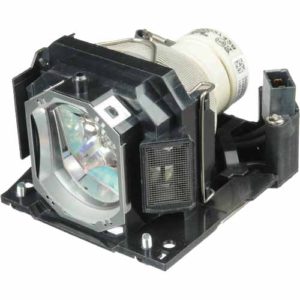
An LCD projector lamp is a type of projector that uses (liquid crystal display) technology. Bulbs for LCD projectors are available in a variety of wattages and sizes,
LCD projector bulb lifespan
They typically last between 2,000 to 5,000 hours.
When shopping for an LCD projector bulb, it is important to consider the brightness of the bulb and the size and shape of the projector. Bulbs with a higher wattage will be brighter, consuming more power and generating more heat.
When choosing an LCD projector bulb, it is also important to consider the warranty. Some manufacturers offer extended warranties of up to 6,000 hours, which can be a valuable investment if you plan on using your projector frequently.
LCD projector lamps have many advantages over other types of projector bulbs, and they are more energy-efficient and generate less heat. Additionally, LCD projector bulbs produce a brighter, clearer image than different bulbs.
LCD projector bulbs also have a few disadvantages. They are more expensive than other projector bulbs, and they typically don’t last as long. Additionally, LCD projector bulbs can be more difficult to replace than different bulbs.
3: DLP Projector Lamp
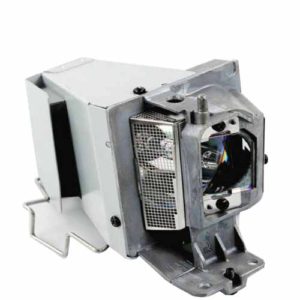
DLP projector lamps use digital light processing to create a sharp, digital image.
Small mirrors, tilted at an angle and placed inside the lamps, are combined with a circuit board, lenses, and a color filter to create a transparent image in these lights. DLP projector lamps don’t require a filter, making them easy to use.
Additionally, the colors in a DLP image can appear more saturated and vibrant than those in other types of projector images. However, one downside to these bulbs is that darker colors may be more difficult to see among different dark colors.
If you notice a colored band appearing on your image that wasn’t there before, it’s likely time to replace the bulb.
DLP projector lamp life
DLP lamp life can vary based on the manufacturer but is typically around 2000-4000 hours.
4: Hybrid Projectors Lamp
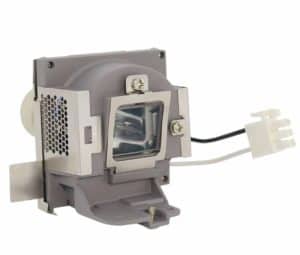
Hybrid lamp projectors are the newest type of projector lamp on the market. These lamps use a combination of traditional incandescent bulbs and light-emitting diodes (LEDs) to produce a bright, high-quality image.
The main advantage of hybrid lamps is that they are much more energy-efficient than traditional incandescent bulbs.
Another benefit of hybrid lamps is that they produce very little heat. This is because the LEDs emit very little heat themselves. This means that your projector will be able to run cooler, which can prolong its life.
Hybrid projector bulb life
They also last much longer, typically around 20,000 hours. This means that you won’t have to replace your projector’s lamp as often, saving you a significant amount of money over time.
If you’re looking for a high-quality, energy-efficient projector lamp, then a hybrid lamp is the way. You’ll get the best of both worlds with this type of lamp.
Disadvantage: One disadvantage of hybrid lamps is that they can be more expensive than traditional incandescent bulbs. However, the long lifespan and energy savings will eventually offset the initial cost.
5: Laser projector lamps
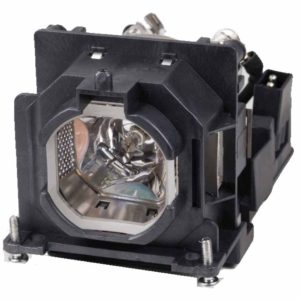
Like in a regular projector, laser projector lamps are used to create the image projected onto a screen or surface. Laser projector lamps are more expensive than other projector lamps.
Laser projector lifespan
They last much longer – up to 25,000 hours. Laser projector lamps also produce a brighter and sharper image than traditional projector lamps.
*Some laser projector lamp producers state that the lamp or light engine can last for a while even when they’re used heavily.
If you’re looking for a high-quality image, then a laser projector is the way. However, a traditional projector will suffice if you’re on a budget.
No matter what type of projector you have, it’s essential to choose the correct bulb. With so many different types of projector lamps on the market, finding the right one for your needs can be a daunting task.
However, by considering the factors discussed above, you can narrow down your choices and find the perfect projector bulb for your needs.
What is a lamp’s half life?
The term half life refers to the amount of time needed for an amount to reduce to half of its original value. When it comes to light bulbs it refers to the quantity of time needed for the bulb to be half as bright as it was originally. The half life of an LED lamp with a lifespan of 10,000 hours is 5,000 hours.
How do I know if my projector bulb is bad?
There are several ways to tell if your projector’s bulb is bad and needs to be replaced.
One way is to look at the projected image brightness; if it gradually dims over time, the bulb is likely going bad. The second way is to look for a built-in lamp counter in the projector; this will tell you how many hours the current bulb has been used and when it needs to be replaced.
Another sign is that the projector makes a strange noise when it is turned on. Finally, if the projected image is significantly dimmer than usual or the projector does not turn on at all, this may indicate that the bulb has most likely reached the end of its life.
If you notice any of these signs, it is best to replace the projector bulb as soon as possible to avoid further damage to the projector.
For more information how to tell if the bulb on your projector needs replacing look to the below subsection.
How do you know if the bulb on your projector needs replacing?
Indicator message/light
A lot of projectors have either a message or indicator light that shows the life of the lamp is about to go. If this message or light comes on, you may not need a new lamp immediately , but it would be a good idea to have one on standby for when a new lamp is needed.
After you replace the lamp it’s important that you reset the lamp timer. If you don’t reset it, you might not receive a warning when the newly replaced lamp is about to die. You can consult the owners manual for instructions on how to reset the hour counter.
Popping sound/Complete failure
If, when you turn the projector on, you hear a popping noise and the screen goes dark, that’s likely the life of the lamp going away.
Projectors make use of high pressure discharge tech made up of a number of components that may fail prematurely as the lamp is used. Just like with turning a light on and hearing the old lightbulb die, you may be able to hear the failure of the lamp in your projector go out.
Image flicker
If you’ve noticed that the projected image is flickering, this could be a sign that there is something wrong with your lamp. If the actual projector hasn’t been exposed to extreme cold or hot, dropped, or damaged in any way, the flicker could likely mean the bulb is about to fail.
Color shifting
Most new projector lamps show, crisp, clear colors. If, when you turn your projector on the colors shown look muddy, a possible reason could be that the bulb isn’t strong enough to show accurate colors using the projectors liquid crystal panel or color wheel.
Projector has dim light
Lets say that you’ve dimmed the lights, have your projector screen all set up, turn the projector on, and the image projected is still dim. This can be because the bulb in your projector needs replacing.
A way to check this is to turn the brightness or color on your projector up. If the room you’re in is about as dark as you can make it, ans your projector is on the highest brightness setting, but the image is still dim, the lamp is about to die.
If you use the lower brightness settings on your projector you may be able to extend the life of the lamp.
Can you upgrade a projector bulb?
As technology advances, so do the capabilities of projector bulbs. Newer and more powerful models are constantly being released, making it tempting to upgrade your projector bulb for a newer, more powerful one.
However, it’s not always as simple as swapping out the old bulb for a new one. Depending on the projector model you have, upgrading the bulb may not be impossible or require special tools or adapters.
Yes, you can change your projector bulb, but It’s always best to consult your projector’s documentation or manufacturer before attempting to upgrade the bulb to avoid damaging your projector or voiding your warranty.
For example, halogen, HID, or UHO lamp bulbs can be replaced with LEDs. The only issue with doing so, however, would be that you may need to redesign a heat sink, internal motherboard, or transformer because of LEDs newer technology.
How much does it cost to replace a projector bulb?
The cost of replacing a projector bulb can vary depending on the type and model of the projector. Generally, replacement bulbs for entry-level projectors start around $100, while bulbs for higher-end projectors can cost upwards of $500 but it can cost as little as $20 for low quality replacement modules.
Additionally, many projector manufacturers require that you use their specific brand of replacement bulbs to maintain your warranty. If you’re looking to save money on replacement projector bulbs, consider investing in a bulb with a longer lifespan.
For example, Epson’s ELPLP88 projector lamp is designed to last up to 10,000 hours, which can help you save money in the long run. Additionally, be sure to check your projector’s warranty before purchasing – some manufacturers offer free or discounted replacement bulbs for their products.
Can I put a brighter lamp on my projector?
Yes, you can put a brighter lamp on your projector; however, doing so may void your warranty. Check with your manufacturer before making any changes.
And keep in mind that projectors are designed to give a specific brightness. If you change any of the projector’s components other components can fail as they aren’t designed for extra heat or power.
What are some tips for extending the life of my projector bulb?
There are several things you can do to extend the life of your projector bulb, including:
- Use your projector in a cool, well-ventilated area.
- Avoid using your projector in dusty or dirty environments.
- Handle your projector bulb with care, and don’t touch the glass with your fingers.
- When not in use, store your projector in a cool, dry place.
Following these guidelines will help ensure that your projector bulb lasts as long as possible.